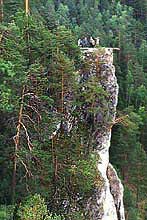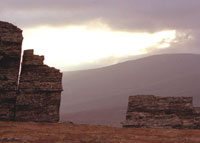Nature trekking / ecotourism in the Ural Mountains
Trekking in the Urals is unlikely to be compared with trekking elsewhere
- it is a thing on its own. One must be aware of the context of backpacking
in Russian nature and needs to have a good set of legs. Distances are
great and civilisation is far away. Nevertheless it is a lifetime experience.
The nature is untouched and so is its beauty. It is also excitingly
unpredictable - nature is rules the area and you will be one with it!
Although our local guides are absolute professionals and know every
inch of the area, not rarely they have to improvise during the tour
because of weather changes, rivers that have turned into rapids, fallen
trees that block a passage, etc. Welcome to the real adventure.
 Prikamye hosts 2 nature reserves where trekkings can be organised.
Prikamye hosts 2 nature reserves where trekkings can be organised.
National Park "Basegi"
Basegi
is a large nature reserve at 200 kilometers northeast of Perm, in the
Ural Mountains. The park has got 3 main mountain ridges and consists
of 3 parts accordingly: South, Central and North Basegi. Its peaks are
among the highest in the area; from there one has a wonderful view over
the vast and virgin Ural forests of Basegi. The reserve is famous for
its diversity of flora, it is a transition zone of leaf forest (south)
and taiga (dense pine forest, north). Civilization in the area limits
to 4 small villages and a number of tiny settlements. Roads are lacking,
apart from a few wide forest tracks. Numerous mountain streams flow
through the area and so do Basegi's two large rivers: the Usva and Vilva.
Example of Basegi tour:
Transfer from Perm to the border of Basegi National Park (around 240 kms,
which is about 5 hours drive) by 4X4 Russian minibus. Lunch. Meeting the guide
at the visit centre. At about 14.00 start of the route “Ecological path” which
goes along the Northern Baseg mountain range 5,5 kms long. It goes through
old coniferous forest, then through alpine meadows and finally you reach the
top of the Northern Baseg ( 951 m). A view over Middle Baseg mountain (994m.),
Oslyanka mountain (1119m.), Khariusny mountain (860m.) Dinner. Transfer back
to Perm. Arrival to Perm at midnight.
Optional: tourists can stay overnight on the territory of the nature reserve and go back to Perm on the 2nd day. Staying overnight in the lodge. Visit to banya (traditional Russian sauna).
Period: Routes can be organised in July, August and September.
State Reserve "Vishersky"
 Vishersky
is an enormous national park (nearly 2,5 thousand square kilometers
or 1,6 thousand square miles - the fourth largest in Europe!!) in the
very north of the Perm province. The park stretches from the Krasnovishersk
district in the south to deep into the Komi Republic (which borders
the Barentz Sea) in the north. Vishersky is a park of extremes. It has
the highest peaks of the entire Ural Mountains, it has wild nature and
it is completely uninhabited. But the most extreme thing about the park
is its beauty. Mountain tops with rapid rivers, dense taiga, open plateaus,
swamps and peculiar rock formations go hand in hand in Vishersky. Similar
to Basegi Nature Reserve, the Vishersky Park may only be travelled accompanied
by a specialised park guide and has a limit on visitor numbers. You
will find yourself spending the night in a tent camp at the banks of
mountain streams. The park has an extensive wildlife and is home of
several protected species. At the southern end of the park, near the
town of Krasnovishersk, one can often spot people at the banks of a
river looking for diamonds. This very river is called the Vishera -
it originates deep in the mountains in the park after which it quickly
turns into a mighty river that eventually flows into the Kama. Vishersky
park has the third largest diamond resource in the whole world. Diamonds
are far too deep to be mined, though.
Vishersky
is an enormous national park (nearly 2,5 thousand square kilometers
or 1,6 thousand square miles - the fourth largest in Europe!!) in the
very north of the Perm province. The park stretches from the Krasnovishersk
district in the south to deep into the Komi Republic (which borders
the Barentz Sea) in the north. Vishersky is a park of extremes. It has
the highest peaks of the entire Ural Mountains, it has wild nature and
it is completely uninhabited. But the most extreme thing about the park
is its beauty. Mountain tops with rapid rivers, dense taiga, open plateaus,
swamps and peculiar rock formations go hand in hand in Vishersky. Similar
to Basegi Nature Reserve, the Vishersky Park may only be travelled accompanied
by a specialised park guide and has a limit on visitor numbers. You
will find yourself spending the night in a tent camp at the banks of
mountain streams. The park has an extensive wildlife and is home of
several protected species. At the southern end of the park, near the
town of Krasnovishersk, one can often spot people at the banks of a
river looking for diamonds. This very river is called the Vishera -
it originates deep in the mountains in the park after which it quickly
turns into a mighty river that eventually flows into the Kama. Vishersky
park has the third largest diamond resource in the whole world. Diamonds
are far too deep to be mined, though.
A 6-day route, including transfer Perm - Vishersky - Perm (4,5
- 5 h), guide, tent/boat hire and simple meals costs around
750 euro per person. Due to heavy snowfall and extremely low temperatures,
the park is inaccessible from October until end of March. Guides
are provided by the Park Administration. Overnight stays in the
park in wooden shelters (with banya), used by park employees. Minimum
2 persons required, maximum 8. Vishersky State National Park is
recommended for experienced hikers.
Example of Vishersky tour:
Day 1 Perm – Krasnovishersk
Transfer from Perm to northern town of Kranovishersk (+/- 330kms).
Meeting with Nature Reserve guide, tour discussion and food supply.
Overnight stay in cottage in a small village 3kms north of Krasnovishersk,
on the banks of the Vishera River. Banya.
Day 2 Krasnovishersk town and its surroundings
From cottage 5kms by car and 2kms hike to top of Mount Polyud (526m)
and back. To the impressive rock formation Vetlan - 4kms by motor boat.
Climb on the rock for a great view over the area. Overnight stay in
cottage, banya.
Day 3 Krasnovishersk town – Vaya village
– 71st quarter
Transfer from Krasnovishersk to the 71st Quarter, via the village
of Vaya - 120kms in total. The 71st Quarter is the location of the southern
border of Vishersky Nature Reserve, the road literally ends here. Overnight
stay in a wooden hut.
Day 4 71st quarter – the Tchuval ridge
Today the real trekking starts and the backpacks need to be strapped
on. Hike from the 71st Quarter to the Chuval Ridge (height 1000m.).
Total distance 17km. Overnight stay in base camp.
Day 5 Base camp – the Listvennichny ridge
– base camp
Hike to the top of the Listvennichny mountain ridge and (if there
is opportunity) the Tulimsky ridge. With its 1469m, Mount Tulym is the
highest peak of the Central and Northern Urals. Visiting the surroundings
of the Isherim mountain and the Muraviny ridge. Taking pictures, video
filming. Overnight stay in base camp. Total distance 20km.
Day 6 Base camp – Listvennichny cordon*
– the Bahtiyarovskaya pit
Hike from the base camp to the Listvenitshny cordon through dense
taiga. After a break, hike to Bahtiyarovskaya pit, via the Moiva river.
Acquaintance with the Bahtiyarov’s family of mansi people. Observation
of beaver’s life. Full day trip, overnight stay in tent.
Day 7 Bachtiyarovskaya pit – Tsitrini cordon
Hike from Bachtiyarovskaya pit to the Tsitrini cordon. Visiting
mine-workings of rock crystal. Taking pictures, video filming of the
Isherim mountain. Total 5-6 hours.
Day 8 Tsitrini cordon – Moiva cordon
Hike to the Moiva cordon, passing the Olchovotchny pass and viewing
the surroundings of the Isherim mountain and the Molebny ridge. Total
18 km. Banya, overnight stay in cordon Moiva.
Day 9 Going to the top of the Isherim mountain.
Hike to the top of Mount Isherim (1331m.) and back. The slope is
quite steep, but main luggage can be left behind. Overnight stay in
cordon Moiva.
Day 10 The Moiva cordon – mouth of the Malaya
Moiva river – Upper Ribnoye village
Hike to the Malaya Moiva River, continue to the tiny Upper Ribnoye
village (at the banks of the river), partly by boat. Viewing picturesque
rocky banks, small waterfalls. Overnight stay in/at the village. Total
distance 10kms.
Day 11 Upper Ribnoye village - mouth of the Bolshaya
Moiva river
From the village to the mouth of the Bolshaya Moive River by boat.
Rocky banks, panoramic view of the Tulimsky mountain. Total 6-7 hours.
Overnight stay in tents at the river.
Day 12 Mouth of the Bolshaya Moiva river –
Vishera rapids – the Lipya cordon
Trip (boat) to cordon Lipya, passing Vishera rapids and scenic
petrified remains. Excursion to self-sustaining farm-stead Lipya and
(if desired) visiting caves. A breathtaking view of the Tulimsky ridge.
Banya. Overnight stay at Lipya cordon.
Day 13 The Lipya cordon – the 71st quarter
– Krasnovishersk town
Trip back to civilisation. On the way scenery of bank rocks, panoramic
views of the Tulimsky ridge and the Kuriskar ridge.
Day 14 Krasnovishersk town – Perm city
Transfer naar busstation Krasnovishersk. Bus Krasnovishersk –
Perm.
Day 15 Extra (reserved) day
Period: June, July, August, early September. Recommended period: August.
Note: because of distances and context of Russian Nature Reserves, this
tour may be done only by reasonable experienced hikers. Large groups
are not allowed.
*cordon: simple wooden hut or shelter used by Reserve personnel.
Other destinations for trekking and expeditions
Although above options are absolutely "off the beaten track" routes,
from time to time we offer initiatives to other destinations than the ones already
mentioned. Mountain bike routes are also available as well as extreme expeditions
in the Urals. Please contact us for
possibilities.
Back



